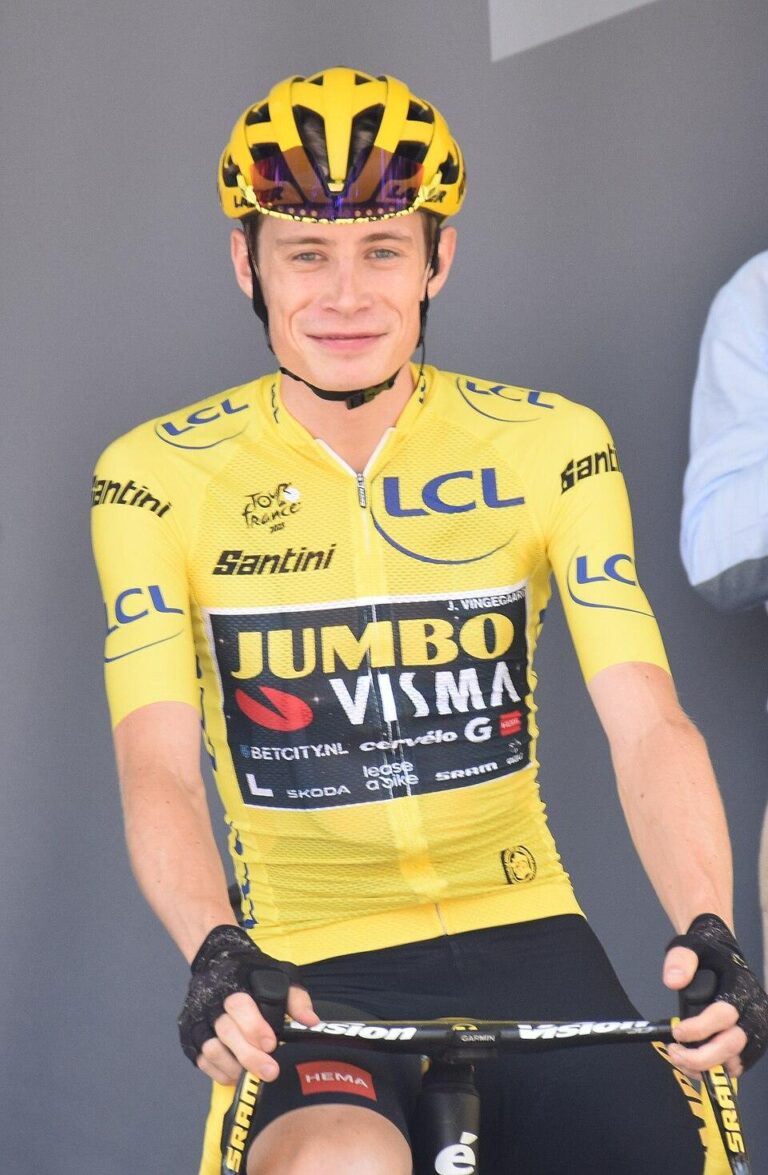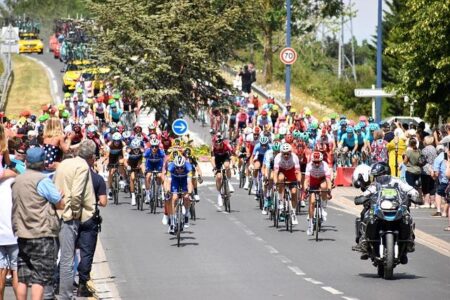Title: A Clash of Titans: Vingegaard vs. Pogacar – Who Will Reign Supreme in the Tour de France?
As the cycling world eagerly anticipates the upcoming Tour de France, the focus is squarely on two of the sportŌĆÖs brightest stars: Jonas Vingegaard and Tadej Pogacar. Both athletes have showcased exceptional talent and determination in previous races, setting the stage for an exhilarating showdown. With Vingegaard, the reigning champion, looking to defend his title against the formidable Pogacar, who has twice donned the yellow jersey, fans and analysts alike are speculating on who holds the edge in this epic rivalry. In this article, we delve into the strengths and strategies of each contender, assessing their chances and the factors that could ultimately determine the outcome of cycling’s most prestigious event.
Tour de France Showdown: Analyzing the Rivalry Between Vingegaard and Pogacar
The rivalry between Jonas Vingegaard and Tadej Pogacar is one for the ages, capturing the attention of cycling fans worldwide. Both riders have demonstrated exceptional skill, stamina, and strategy, making every head-to-head encounter a thrilling spectacle. As the 2023 Tour de France approaches, the stakes are higher than ever, with each athlete bringing formidable strengths to the table:
- VingegaardŌĆÖs climbing prowess: His ability to conquer steep ascents has made him a powerful contender in mountainous terrains.
- PogacarŌĆÖs versatility: Known for his all-around capabilities, Pogacar can excel in climbs, sprints, and even time trials.
- Team dynamics: Both riders are backed by strong teams, which play a crucial role in their overall strategies.
Adding another layer to this intense rivalry is their contrasting personalities and racing styles. Vingegaard tends to exhibit a more calculated approach, focusing on endurance and sustainability throughout the stages. In contrast, Pogacar often employs aggressive tactics, frequently attacking from the front, thus keeping opponents on their toes. This ever-evolving duel not only elevates the competition but also captivates diverse audiences, turning every stage into a high-stakes battle.
| Rider | Key Strengths | Racing Style |
|---|---|---|
| Jonas Vingegaard | Climbing, Endurance | Calculated, Patient |
| Tadej Pogacar | Versatility, Sprinting | Aggressive, Attacking |
Recent Performances: Current Form of the Leading Contenders
Both Jonas Vingegaard and Tadej Pogacar have showcased stellar performances leading up to the Tour de France, making the competition even more captivating. Vingegaard recently clinched victory at the Crit├®rium du Dauphin├®, demonstrating exceptional climbing ability and strategic prowess. His consistent top finishes in the mountains and time trials indicate he has honed his skills and endurance for the challenges ahead. Key strengths include:
- Climbing Efficiency: Vingegaard’s ability to maintain pace in mountainous terrains.
- Time Trialing: Proving himself as one of the best in time trials this season.
- Race Strategy: Ability to read races and make tactical decisions under pressure.
On the other hand, Pogacar remains a formidable opponent with his previous Tour victories under his belt. His recent performances at the Tour of Flanders and Li├©ge-Bastogne-Li├©ge have left an impression, highlighting his versatility and stamina across various terrains. Known for his aggressive race style and tactical acumen, Pogacar thrives in dynamic racing environments. Notable aspects of his form include:
- High Race IQ: Pogacar has an innate ability to outmaneuver competitors.
- Strong Sprint Finish: A powerful closing sprint that can secure late-stage victories.
- Resilience: Proven ability to recover from and endure throughout multi-stage races.
Tactical Advantages: How Team Strategies Could Influence the Outcome
In the high-stakes world of the Tour de France, team dynamics play a pivotal role in determining the eventual champion. Both Jonas Vingegaard and Tadej Pogacar boast exceptional individual talent, but their respective teams could significantly influence their chances of victory. Team support, such as protecting the leader during climbs and controlling the pace in flat stages, can enhance performance and conserve energy for crucial moments in the race. A well-synchronized team can create tactical advantages through strategic setups that force opponents to react, leading to missed opportunities. Consider the following factors:
- RidersŌĆÖ Roles: Each team has designated roles, from domestiques to climbers, creating a layered approach to race strategy.
- Pacing and Energy Conservation: A strong lead-out can conserve energy for key climbs, maximizing the leader’s power at critical junctures.
- Attacks and Deflections: Utilizing tactical attacks to distract competitors can prevent focused efforts on the primary leader.
Analyzing past races reveals that teams often excel when they can execute well-defined strategies while adapting to evolving race conditions. The interplay between teamwork and individual prowess may give Vingegaard a slight edge if his Jumbo-Visma squad can maintain cohesion and capitalize on PogacarŌĆÖs UAE Team Emirates vulnerabilities. A brief overview of their respective teams and tactical strengths is illustrated below:
| Team | Tactical Focus | Key Strengths |
|---|---|---|
| Jumbo-Visma | Controlled aggression, relentless pacing | Strong climbers, proficient time trialists |
| UAE Team Emirates | Dynamic attacks, flexibility in strategy | Versatile riders, effective at countering moves |
Historical Context: A Look Back at Past Encounters and Their Impact on the Race
As the rivalry between Jonas Vingegaard and Tadej Pogacar intensifies, itŌĆÖs essential to dive into the rich tapestry of past encounters that have shaped their careers and the Tour de FranceŌĆÖs storied legacy. Historically, the battle for the yellow jersey has seen the emergence of numerous cyclists who have left an indelible mark on the sport. Key moments have often defined not just the outcomes of individual races but also the paths these athletes have taken. Notable encounters, such as the epic face-offs in the 2021 and 2022 editions of the Tour, exemplify how each rider brings unique strengths to the road, creating a narrative laced with drama and suspense that captivates fans worldwide.
The impact of these historical battles can be assessed by examining trends in performance, strategic innovations, and shifts in team dynamics. Factors influencing these encounters have included:
- Team Support: How the cyclistsŌĆÖ teams have impacted their overall performance.
- Tactical Approaches: Varying strategies employed during key stages, such as time trials and mountain climbs.
- Injury and Form: How fluctuations in physical condition have affected their competitive edge.
These factors not only set the stage for thrilling races but also underscore the relentless pursuit of excellence that defines this iconic event. This recursive history not only shapes the current dynamics but also offers a glimpse into what might be expected in the forthcoming races between these cycling giants.
Final Thoughts
As the countdown to the Tour de France intensifies, the rivalry between Jonas Vingegaard and Tadej Poga─Źar continues to captivate cycling fans across the globe. Both riders bring unique strengths to the table, and their head-to-head battles promise to deliver thrilling performances throughout the race. While VingegaardŌĆÖs formidable climbing ability and strategic prowess make him a formidable contender, Poga─ŹarŌĆÖs explosive speed and relentless determination are equally compelling.
As we await the Grand Depart, the question remains: who will emerge victorious in this epic showdown? Whether you support VingegaardŌĆÖs quest to defend his title or are backing Poga─ŹarŌĆÖs ambition to reclaim gold, one thing is certainŌĆöthe 2023 Tour de France is shaping up to be a remarkable chapter in cycling history. Stay tuned for updates, analyses, and race highlights right here on Flashscore.com.




